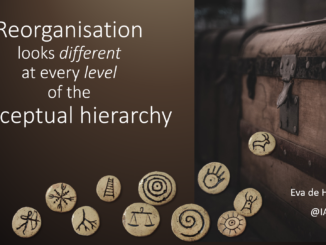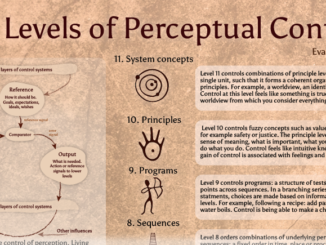
This is a (rough) translation of the article “Prefectionisme” that appeared in the Journal of the Dutch Institute for Psychologists in May 2021. The open access original version in Dutch is available at https://perceptualcontrol.nl/artikelen/opinie/prefectionisme/.
“Dear Colleague,
Patients feels like she’s stuck: a lot of stress / tension, because she’s not able to do certain things as well as she’d do otherwise. Is a prefectionist. She has had coaching, but failed to transform her symptoms.
Please help the patient with her perdectionism. ”
Looking back, I think it is hilarious that my otherwise very capable GP manages to misspell perfectionism twice in her referral letter. I could not laugh about it back then. I could not laugh about anything anymore. I sat in front of my laptop every morning and did not know what my purpose was. A project failed and I felt like being dead was a more attractive idea than continuing to work. Since my father’s sudden death a few months earlier, my whole life seemed as grey as the winter around me. Working fewer hours, carrying fewer tasks, nothing worked to get me back on track. Talking to a coach seemed pointless to me, my previous experiences had been useful for a short time but had little depth. I wanted real help.
I made a list of the possibilities for psychological help in the neighbourhood and ran into my perfectionism. One counsellor chose to use comic sans as the font on her website: obviously wrong. One psychologist put her Christian signature first: crossed off the list. One showing off his registrations and titles: never mind, I will look further. I was left with two options to put myself on the waiting list and ended up with a schema therapist.
In therapy, my perfectionism turned out to be more beneficial than an actual problem. The therapist asked me to write down my life story and I mapped the core themes in perfect order. I worked through a Schema Therapy book and discovered how different sides of myself helped and hampered each other. With a few sessions of EMDR, I was able to experience painful moments from the past in a much more gentle way. I was done faster than expected. This second winter felt softer, more alive, and less dreary. I was stable again and felt stronger than years before. But not an inch less perfectionistic.
During the course of that year in therapy, I was introduced to Perceptual Control Theory (PCT) through a chance meeting. I took a Method of Levels course and this time, my perfectionism did not get in my way, but drove me to continue to discover this effective talk therapy and the complex but fascinating theory behind it: PCT.
In previous postgraduate education – an intensive course in cognitive behavioural therapy – I was particularly troubled by my perfectionism. And my teachers too. I wanted to understand everything, pointed out what was wrong, was confused by inconsistent ideas and got into conflict with sloppy teachers. My education was stuck at the basic course and I could not find motivation to ever delve further into the dominant therapy model in mental health care.
Now that I immersed myself in PCT on my own, the experience was completely different. My perfectionism was not a burden but a sign of a well-functioning machine. When I read something and did not understand it yet, I read more, horizontally, vertically, diagonally. I copied and corrected figures, tried out simulation models. My brain was running at full speed for a year and a half. I did not think about anything else and did not want to talk about anything else. If you understand how control of perception works, you start to see it everywhere. Who wouldn’t want to understand how people function? Not everyone, it seemed. Getting to know an explanatory model like PCT in depth meant that my entire thinking was reorganized, with major consequences.
My work constantly stressed me because no matter how hard I tried; I could never do well enough for myself. I want to understand what I am explaining, but when I tried to grasp the knowledge that I had to transfer, it felt like loose sand sliding between my fingers. When I explained learning theories using classical and operant conditioning, I could only use examples with dogs and rats, because the principles often did not hold true for humans. Stories that form the basis of psychology, such as the Stanford Prison experiment, have been distorted and proved false. Results around which a research field was set up, which I referred to in my PhD research on cognitive biases, seemed too good to be true and did not come close to what we found ourselves. Subjects never followed instructions and never did what we expected. Statistics was a way to disguise the triviality of results. Conversations with colleagues were about everything except the content of our profession. Everything I knew felt like insignificant noise.
Now, three years after I closed my laptop because I would rather die than continue working, I see how I was stuck with my perfectionism, but perfectionism was not the problem. The problem was that so much was wrong. What I was looking for in psychology was an understanding of how people work, but that goal seemed to get further and further away in the tangle of boring research, shoddy articles, lazy teaching, and inconsistent ideas. I could not get it done and thought I was the problem, that I did not understand stuff well enough. I wanted to give everything for my work, but my work did not match what I felt and how I wanted to be.
Perfectionism means that you are sensitive to signals that something is right or not. That you notice mistakes and want to improve because that feels calmer. That you keep going until you feel that it is right. If it is never right, you always keep going with the risk of overload and burnout. People often advise taking it easy, not taking on so much, lowering the bar. However, I now think that is not the best advice: your feeling that it is not right might mean that something important is not right and your feelings are justified. That a lot has to change.
Noticing whether something is right or not is an important concept in PCT: you control by constantly comparing the state of what something is like now, with how you want something to be. The difference between them is the error. You can recognize this error by the feeling that it is not yet right, the drive to keep going and the will to correct an error. I had (and have) set the bar high: I want to understand how it works with my head, heart and hands. If I experience in my whole being that something is not right, it means that my experience as it is now is not the way I would like it to be. Then I have to do what I can to create that experience, or else I have to adjust my higher goals – who I want to be or what I think is important. If my whole being protests, I have to give that whole being room to make amends.
Slowly but surely I noticed that I was building a new knowledge structure, in which all the knowledge of my studies, PhD and work was being rearranged and cleaned up. This PCT building now offers me the space to feel knowingly and to know with feeling. I constantly test this structure against what I learn, read, experience. I enjoy conversations with people who speak the same language, with the same mechanisms in mind. I cannot read a newspaper article without a mark in the margins: this is about control!
If everything were right for me right now, you would look at me and find me calm and quiet. However, I rarely am like that. On the contrary. I no longer struggle with perfectionism, but with constant unrest. I am bothered by the amount of nonsense, the crooked reasoning, and the good intentions with disastrous consequences in psychology. Especially the idea that people think they can determine what is good for others, if we just collect enough data. I like to understand things myself, but I also want others to understand the same thing so that together we can build stronger knowledge and a more humane society.
From a higher level, where I see myself and other people fumbling and struggling, I can sometimes consider myself more calmly as a small part of the whole. However, usually my attention is focused on what I currently encounter that is not right and I worry about that. I ask critical questions, gently testing how sacred our sacred cows actually are. I often feel like an outsider who sees things differently.
I no longer worry about perfectionism. It was a good excuse for the GP not to have to talk about personality pathology and still manage to send me to a schema therapist. A quick label that prevents people from asking themselves or others bigger questions about what exactly is wrong with their world. With a broad mind and a sensitive heart, it is not easy to get things right. If you find a sacred cow that blocks your way, try to topple it. 1Please don’t actually try to topple cows, sacred or not. I’ve got nothing against cows. In Dutch, we don’t topple cows but kick against sacred little houses. That has a different ring to it. It might become prefect.
Eva de Hullu



